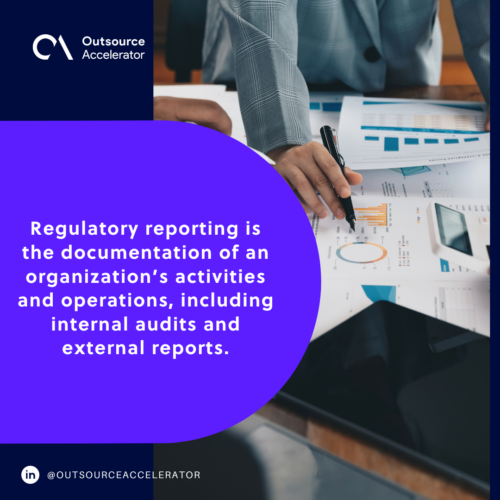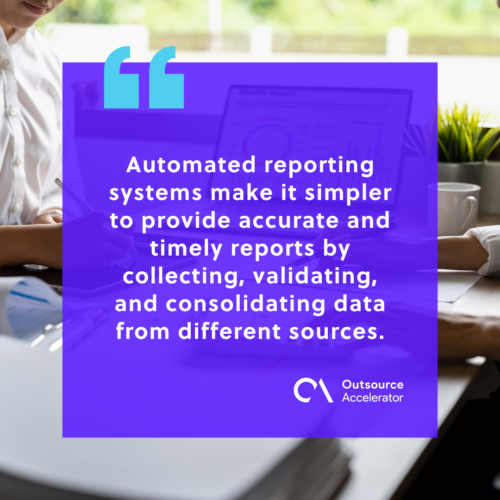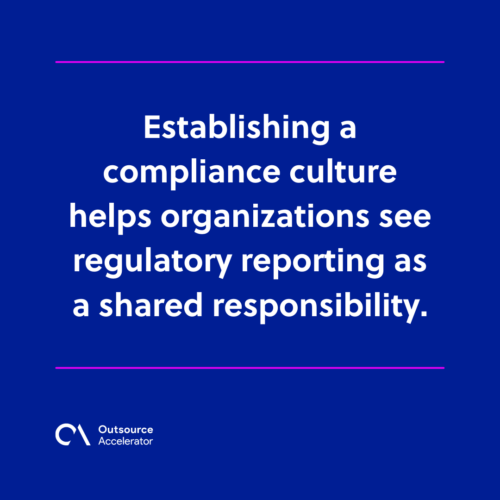What is regulatory reporting?

As financial markets expanded and became increasingly complex, so did the volume of financial transactions and instruments.
This created various challenges for regulators regarding the effective monitoring of the activities of financial institutions.
Regulators began requiring standardized, comprehensive, periodic information from financial entities to address this issue. This concept came to be known as regulatory reporting.
Over time, advancements in computers and information technology (IT) led to a transformation in regulatory reporting.
Manual and paper-based systems were replaced by digital ones, which improved accuracy and efficiency in data collection and dissemination.
Financial institutions can now submit their reports online, reducing burdens for themselves and regulators by simplifying analysis and decision-making processes.
This article delves deeper into the concept of regulatory reporting. In the following sections, you will learn the risks of inefficient reporting and the best practices for optimizing it in your business.
Regulatory reporting explained
Regulatory reporting is the documentation of an organization’s activities and operations, including internal audits and external reports.
Regulatory compliance is the collection of rules and guidelines set by financial authorities and governments. Banks, investment firms, insurance companies, and other financial entities are required to abide by these standards, which include regulatory reporting.
The purpose of reporting is to ensure that all relevant information is available to those who need it. All aspects of a business should operate according to the law and best practices.
These regulations seek to protect consumers, investors, and the market from systemic risks and financial crimes.
Institutions must submit timely and accurate reports to show their stability, risk exposure, and adherence to rules.
Different criteria and frequency of reporting may apply depending on the institution’s type, size, and sector.

What are the risks of inefficient regulatory reporting?
Inefficient regulatory reporting can harm a company and the entire financial ecosystem.
The following are some of the risks associated with poor regulatory reporting:
Damage to reputation
An organization’s reputation might suffer due to inaccurate or delayed reporting. This can also damage the trust of investors and clients.
Penalties for non-compliance
Regulators apply severe penalties and sanctions for failure to submit reports promptly. This may have a significant impact on a company’s financial resources.
Commercial disturbances
Errors in regulatory reporting can cause business operations to be interrupted or even suspended until compliance is completed.
Increased regulatory oversight
Poor regulatory reporting practices may result in regulators paying more attention to your business, leading to more audits and stricter supervision.
A rise in operating expenses
Ineffective regulatory reporting could result in duplicated procedures and more expensive operations.
Best practices for improving regulatory reporting
Financial institutions can enhance their regulatory reporting through the implementation of these best practices:
Automation
Automated reporting systems are one of the most important developments in regulatory reporting.
Financial institutions can streamline their processes by investing in technology that automates the reporting process and lowers the possibility of errors.
Automated reporting systems make it simpler to provide accurate and timely reports by collecting, validating, and consolidating data from different sources.
This helps businesses minimize the risk of potential fines and regulatory non-compliance by guaranteeing that reports are completed on schedule while saving time and money.

Regular education and training
Financial institutions are subject to constant updates and changes to regulations. For this reason, companies must keep their personnel aware.
By attending frequent training sessions, employees involved in regulatory reporting can stay current on best practices and the most recent reporting standards.
Well-informed and trained staff are more equipped to comprehend the complexity of rules and overcome any difficulties that can arise during the reporting process.
Validation and correctness of data
The data included in regulatory reports must always be accurate and reliable.
Strong data validation procedures must be put into place. This helps keep the data’s accuracy and consistency displayed in reports.
Compliance culture
By establishing a compliance culture, your organization would see regulatory reporting as a shared responsibility. Adopting this culture encourages regulatory compliance, ethical conduct, and transparency.
This strategy also promotes confidence among regulators and stakeholders, ultimately improving the institution’s standing in the market.

Establishing a reporting framework
A clear reporting structure must be established for the reporting process to remain consistent and effective.
Each team member’s specific tasks and responsibilities should be outlined in this framework.
This ensures everyone knows their duties and due dates and follows the same data collection, validation, and submission protocols.
Why optimizing regulatory reporting is important
As established, regulatory reporting is a requirement in the financial industry. This makes optimizing regulatory reporting a vital practice institutions should pay attention to.
Besides compliance, efficient regulatory reporting offers various advantages.
An organization has a better chance of standing out in the market by using effective reporting processes.
This maintains confidence among current stakeholders and regulatory authorities and attracts investors and clients that value compliance and openness.
An institution’s risk exposure can be fully viewed with accurate and timely reporting, enabling improved risk management decisions.
It also enables companies to make proactive and educated business decisions.
Financial firms can reap these benefits by implementing the best practices discussed in this article.







 Independent
Independent




